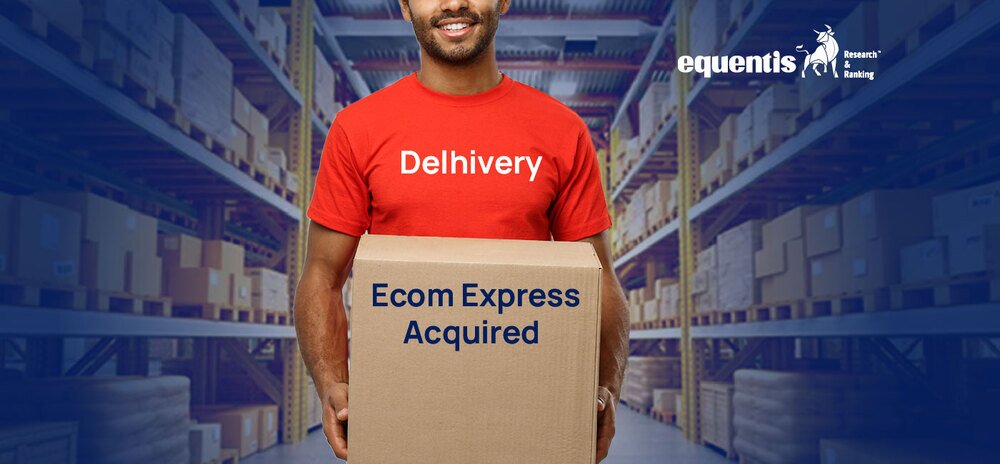Leading logistics company Delhivery has announced its acquisition of Ecom Express for ₹1,407 crore in an all-cash deal. While the transaction is significant in itself, the story behind it makes it more compelling. Once valued at nearly ₹7,000 crore, Ecom Express is now being acquired at an 80% discount. This shift reflects a downturn for one company and the changing dynamics of India’s startup and logistics ecosystem.
Here’s a breakdown of the deal, its structure, the reasons behind the valuation cut, what it means for Delhivery, and the larger signals it sends across the industry.
The Deal: What’s on the Table
Delhivery will acquire a 99.4% stake in Ecom Express in an all-cash deal. The deal provides a complete exit to Ecom Express’s current shareholders, including global investors like Warburg Pincus, CDC Group (British International Investment), Partners Group, and the company’s founders.
Delhivery had previously invested in Ecom Express in 2017 through its fund, making this an acquisition and a full-circle return on an earlier strategic bet. This deal also provides Delhivery with an immediate expansion of service capacity, especially in regions where Ecom Express has already built strong infrastructure. It creates opportunities for streamlining logistics operations and boosting last-mile delivery performance.
The deal’s structure also reflects a growing trend of companies using stock options with cash to preserve liquidity while securing strategic acquisitions. For Delhivery, this is a capital-efficient way to expand aggressively without overstretching financially. Source: Economic Times
Why the Valuation Drop?
The detail that stands out the most is the steep markdown from a ₹7,000 crore valuation in 2021 to ₹1,407 crore in 2024. A number of operational and market realities contributed to this:
- Ecom Express lost its largest client, Amazon, which pulled back a significant portion of its business.
- The company saw the exit of key leadership, including co-founder and CEO T.A. Krishnan.
- Revenue growth remained largely flat, failing to keep pace with competitors.
- With mounting costs and a challenging funding environment, existing investors hesitated to provide further capital.
As investor confidence weakened and internal momentum stalled, Ecom Express faced limited options. The decision to sell to Delhivery was likely the most viable outcome, offering stakeholders a complete exit and some value recovery.
Furthermore, as the e-commerce logistics market evolved, Ecom Express struggled to innovate or diversify its services. In contrast, competitors like Delhivery leveraged technology and data analytics to improve efficiency and gain market share, creating a clear gap in strategic positioning. Source: Economic Times
Strategic Gains for Delhivery
For Delhivery, this acquisition isn’t just opportunistic—it’s strategic.
By acquiring Ecom Express, Delhivery gets:
- Increased last-mile delivery capacity, particularly in Tier 2 and Tier 3 cities
- Stronger rural reach, helping the company serve customers in underpenetrated markets
- Higher shipment volumes, especially in the fast-growing e-commerce segment
- Operational synergies through the integration of delivery networks, hubs, and technology platforms
It also offers cost optimization opportunities. With overlapping delivery zones and infrastructure, Delhivery can consolidate operations, shut redundant facilities, and optimize manpower.
This is especially important in a sector where margins are thin, and efficiency often determines profitability. Delhivery is aiming to become a long-term profitable logistics company, and this acquisition supports that direction.
The move also allows Delhivery to neutralize competition by absorbing a former rival. With fewer players vying for the same contracts and customer base, Delhivery will likely gain pricing power, better contract terms, and increased share-of-wallet from enterprise clients.
Revenue: Flat Growth vs. Upward Momentum
The operating revenue figures are key data points that explain the deal’s rationale. While Delhivery and Blue Dart posted steady growth between FY2023 and FY2024, Ecom Express showed only a marginal increase:
This flat growth underlines Ecom Express’s struggle to scale revenue in a rapidly expanding market, making Delhivery’s acquisition offer both timely and logical. Delhivery’s consistent revenue climb positions it as a consolidator with the financial muscle to absorb and revitalize underperforming players.
What This Means for the Industry
This acquisition isn’t just about two companies. It reflects a broader trend in Indian logistics and startup funding:
- Consolidation is accelerating as market leaders buy out weaker or slower-growing peers
- Profitability is being prioritized over high valuations
- Private equity and venture capital are more cautious, especially in capital-heavy sectors
- Publicly listed companies like Delhivery have an edge thanks to easier access to funding and deal-making tools
As investors increasingly demand returns and not just growth, companies are under pressure to rethink their business models. Asset-heavy firms like Ecom Express, without significant tech-driven differentiators or consistent revenue upticks, are becoming targets for buyouts rather than fresh capital.
What’s also becoming clear is that the logistics industry is no longer just about delivery; it’s about data, network intelligence, and the ability to adapt quickly. Companies like Delhivery that are betting on end-to-end integration and real-time tracking solutions are setting the pace for the future.
The Road Ahead for Delhivery
With the acquisition completed, Delhivery will begin integrating Ecom Express’s assets. This includes:
- Unifying sorting centers, warehouses, and delivery fleets
- Aligning technology platforms and back-end systems
- Restructuring teams and roles for efficiency
- Successful execution could lead to:
- Lower cost-per-delivery through scale
- Faster turnaround times
- Better customer satisfaction metrics
However, integrations are never easy. Delhivery will need to carefully manage cultural alignment, system migrations, and operational disruptions to realize the benefits of this deal fully.
Conclusion
Delhivery’s acquisition of Ecom Express marks a turning point in India’s logistics story. It brings together two players in a rapidly evolving space but also highlights the hard truths facing startups today. The message is clear for founders and investors alike: valuations must be earned, not assumed.
As Delhivery strengthens its presence and works toward profitability, this deal could set the tone for more such consolidations in the near future. It also raises the bar for performance in logistics—where technology, efficiency, and adaptability determine who thrives and who exits.
Related Posts
Disclaimer Note: The securities quoted, if any, are for illustration only and are not recommendatory. This article is for education purposes only and shall not be considered as a recommendation or investment advice by Equentis – Research & Ranking. We will not be liable for any losses that may occur. Investments in the securities market are subject to market risks. Read all the related documents carefully before investing. Registration granted by SEBI, membership of BASL & the certification from NISM in no way guarantee the performance of the intermediary or provide any assurance of returns to investors.
FAQs
Why did Ecom Express agree to a sale at such a low price?
Due to operational struggles, leadership exits, funding constraints, and stagnant revenue, the company had limited options. A sale provided a clean exit for investors.
What does Delhivery gain from this deal?
Delhivery gets a wider reach, better infrastructure in rural India, and increased shipment volumes—all of which support its long-term growth plans.
Will Ecom Express continue to operate under its name?
No official announcement has been made, but full ownership suggests Ecom Express will likely be absorbed into Delhivery’s operations.
How did the market respond to the deal?
Delhivery’s shares saw a small increase post-announcement, indicating cautious optimism from investors.
What does this deal signal for the future of logistics in India?
It shows that growth alone isn’t enough. Companies must prove their ability to scale sustainably, manage costs, and deliver returns.
How useful was this post?
Click on a star to rate it!
Average rating 0 / 5. Vote count: 0
No votes so far! Be the first to rate this post.
waitfor delay '0:0:5'--
I’m Archana R. Chettiar, an experienced content creator with
an affinity for writing on personal finance and other financial content. I
love to write on equity investing, retirement, managing money, and more.
 Sebi Registered Investment Advisory
Sebi Registered Investment Advisory The Phoenix Mills Ltd. (PDF)
The Phoenix Mills Ltd. (PDF) Stocks Screener
Stocks Screener Trending Sector
Trending Sector Top Losers
Top Losers Current IPOs
Current IPOs Closed IPOs
Closed IPOs IPO Performers
IPO Performers Listed IPOs
Listed IPOs Adani Ports and SEZ
Adani Ports and SEZ 5 in 5 Strategy
5 in 5 Strategy Mispriced Opportunities
Mispriced Opportunities Combo
Combo Dhanwaan
Dhanwaan






























